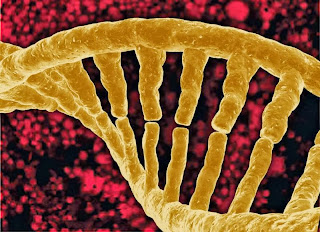Many Christians reflect on questions of human dignity, personal identity, and social justice. What happens when you introduce a scientific angle, such as the bioethical questions raised by genetic research and technology?
This is the question posed by When Christian Faith and Genetics Meet, a Christian adult education program produced by the Canadian Council of Churches and co-written by the Rev. Canon Dr. Isaac Kawuki Mukasa, General Synod's coordinator for dialogue.
"When we put this curriculum together we basically Canadianised an American resource," says Kawuki Mukasa. "As we read it through we found we needed to rewrite the whole thing—contextualizing it to Canadian culture and sensibilities."
"The resource is about trying to interface genetics with theology and the Gospel. There are people who have ethical questions about technology and what new scientific discoveries mean for their faith. What this resource does is give bioethical scenarios which could easily happen in real life and then guide discussion on the ethical and theological questions they raise."
Each session is self-contained-not depending on any previous sessions—and is designed for use by congregations or small groups. The curriculum runs five weeks, but can be adjusted for the needs of the group.
"The way a session runs is that you have a scenario... a story," says Kawuki Mukasa. "Questions emerge out of that story and are listed in the session material, and people are then encouraged to talk how they feel about the scenario, what they would do in that given situation as Christians. Background information on the science itself is included, and is carefully written so that it's not very technical, but still thorough."
Before the curriculum was officially released, two of the sessions received a trial run as part of a pilot program in congregations across several denominations, including the Anglican Church of Canada.
St. Augustine of Canterbury Anglican Church in Toronto tested the resource with a group of 10 congregants, led by then-incumbent Fr. John Wilton.
"I was interested immediately because I think it's a topic that church people—or just people in general—need to grapple with," says Wilton. "And it interested me because it wasn't something I'd known much about. Clearly people had put tons of hours of work into this thing, and I was willing to give it a try."
The group at St. Augustine's covered a wide spectrum of educational levels, from those who hadn't completed much education, to the very highly educated—including a professor and researcher of genetics.
"The people who took part thought it was very much worthwhile, even though we didn't reach any conclusions," says Wilton.
"It taught them how important it is for Christians to be involved in the conversation around what at first seems like strictly medical and scientific issues... that there is a Christian voice that needs to be heard when people are talking about these things. Especially an informed Christian voice and not a knee-jerk reaction."
Click here to see a practical group resource on Christian Faith and Genetics from the Council of Churches.


No comments:
Post a Comment